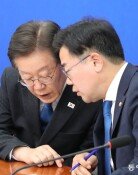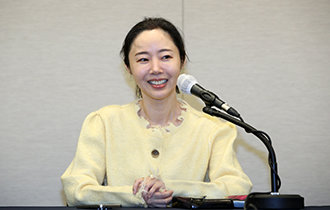Recognizing the roots of the public`s anger
Recognizing the roots of the public`s anger
Posted October. 30, 2011 05:17,
The ruling camp is a chaotic mood due to the controversial resignation of presidential chief of staff Lim Tae-hee following the ruling Grand National Party`s loss in Wednesday`s by-election for Seoul mayor. President Lee Myung-bak ordered Lim to remain at his post for the time being and to help regain public trust. Party insiders tell of an intense power game between lawmakers seeking to gain the upper hand in intra-party competition to secure political power. The ruling party seems to have forgotten stern warnings issued by Seoul`s 8.37 million voters. Its general meeting also was full of sighs on Friday.
The decision to keep Lim has ended the controversy, but all other candidates considered for the post were also President Lee`s key confidants. This is why his human resources pool is likened to a well. He displayed this outmoded practice in his recent appointment of officials at state-run organizations. His excuse that finding qualified personnel in the final years of his term is difficult hardly makes sense. Unless the Lee administration changes the practice of its personnel management meant to give favors to his confidants, a practice that started with appointments of many of his acquaintances as Cabinet members early in his term, the government`s pledge to regain public trust will prove to be an empty promise.
Korea has ushered in the era of 6 million temporary workers, who account for 34.2 percent of the workforce. The portion of college graduates or those with higher education among such workers hit 31 percent, up from 29.5 percent last year. The portion of middle-income households stood at 75 percent in the 1990s, but has recently fallen to 66 or 67 percent. In contrast, the number of impoverished families exceeded 3 million for the first time last year, and the portion is twice as high as the average of the Organization for Economic Cooperation and Development (10.6 percent). People in their 20s, 30s and 40s are sick and tired and can hardly see a promising future. Their disappointment and anger were illustrated by the results of the by-election.
President Lee started as a non-mainstream person but shot to phenomenal success as a salaried worker. He was then granted the novel mission to make change and revive the economy. This was the critical factor that got people in their 20s, 30s and 40s voted for the Grand National Party in the 2007 presidential election. Lee declared an "era of the people`s success" in presenting a rosy picture, but has delivered little results. Are the staff of this administration aware of cynical phrases in vogue such as "90 percent of people in their 20s are unemployed," and "locust interns (people working at different places as interns while failing to land jobs)," and "the long-term unemployed?"
People in these age groups felt significant financial burden due to sudden hikes in jeonse, or the practice of renting a home in return for a large deposit, and were greatly angered over the debacle surrounding the president`s purchase of land for his retirement home. Many people who were forced to retire early and unemployed college graduates feel a sense of unfairness over the administration`s appointment of certain people to key posts as favors. President Lee should recognize the underlying cause of anger afflicting people in their 20s, 30s and 40s.
As the end of his term draws nearer, personnel surrounding the president will seek to build up a bulwark to protect their turf and interests. As a result, the presidential office is making decisions that run counter to public sentiment. Knowing the reason people in their 20s, 30s and 40s are so angry is the starting point for President Lee to regain public trust.







